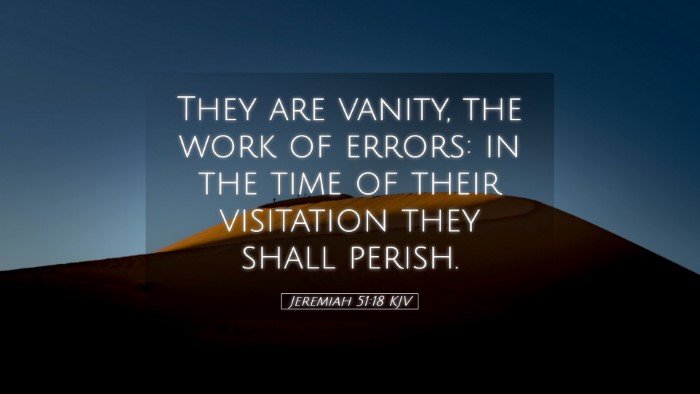Commentary on Jeremiah 51:18
Verse: "They are vanity, the work of errors: in the time of their visitation they shall perish."
This verse presents a powerful condemnation of idolatry and the transient nature of false gods, specifically directed towards the idols of Babylon. The context of Jeremiah’s prophecy focuses on God’s judgment against Babylon and the folly of those who place their trust in earthly powers and idols.
Historical Context
The Book of Jeremiah spans a significant period during the last days of the kingdom of Judah, prior to its destruction by the Babylonians. Jeremiah’s prophecies highlight the dangers of idolatry and the ultimate fate that awaits those who forsake the true God for false deities.
Commentary Insights
Matthew Henry
According to Matthew Henry, the phrase "they are vanity" underscores the futility and emptiness of idols. He emphasizes that idols, which might seem to offer protection and strength, are fundamentally "the work of errors." This language suggests not only the spiritual blindness of those who worship them but also the deceptive allure of worldly pursuits. Henry argues that when the time comes for divine judgment ("the time of their visitation"), these false gods will be revealed for what they truly are: powerless and transient.
Albert Barnes
Albert Barnes further elucidates the depth of this verse. He points out that "the work of errors" implies that the construction and reverence of idols result from misguided reasoning and moral failure. Barnes notes that the term "vanity" characterizes idols as lacking both substance and permanence. In his analysis, Barnes stresses that during the visitation from God—an apocalyptic moment for the Babylonians—their idols will fall, demonstrating that reliance on anything other than the true God leads to inevitable destruction. This serves as a warning to all believers about the consequences of idolatry.
Adam Clarke
Adam Clarke offers an insightful exploration of the theological implications of this verse. Clarke interprets "they are vanity" as a divine indictment that speaks to the fundamental nature of idolatry. He states that "the work of errors" denotes the corrupt practices surrounding the worship of these false gods, including the rituals and sacrifices that never achieve their intended purpose. Clarke emphasizes that the phrase “shall perish” is not merely a prophetic statement about idols but rather a truth about the fate of all that opposes God's sovereignty. He argues that faith in such works is equivalent to faith in vain pursuits that ultimately lead to spiritual ruin.
Theology of Judgment
The theological undertones of this verse reveal a profound understanding of God’s judgment. The "visitation" mentioned refers to a specific time of reckoning where God's justice is executed. This act of God is neither arbitrary nor cruel; it serves to reveal the truth of His sovereignty. Understanding this judgment is crucial for grasping the broader narrative of redemption and the ultimate triumph over sin and idolatry.
In acknowledging the reality of divine judgment, believers are called to reflect on their own allegiances. Are there "vanities" or "works of errors" in their lives that might usurp the rightful place of God? This introspection is vital for spiritual growth and integrity.
Practical Application
This verse serves as a stark reminder for contemporary believers and church leaders alike. Here are some practical points of application:
- Discernment: Assessment of what constitutes an idol in today’s society—whether it be materialism, power, or even personal ambitions.
- Faithfulness: Encouraging congregants to put their trust in God alone, rather than transient worldly assurances.
- Repentance: A call to acknowledge and forsake those idols that distract from a genuine relationship with God.
- Hope: Reminding oneself and others that God’s ultimate plan leads to restoration and redemption, contrasting the fate of idols.
Conclusion
In conclusion, Jeremiah 51:18 is rich with theological significance and practical implications for believers. Through the insights provided by Matthew Henry, Albert Barnes, and Adam Clarke, we receive a clearer understanding of the futility of idols and the inevitable judgment that falls upon them. This scripture calls us to renew our faith in the living God, who endures eternally, unlike the "vanities" we often encounter in life.


